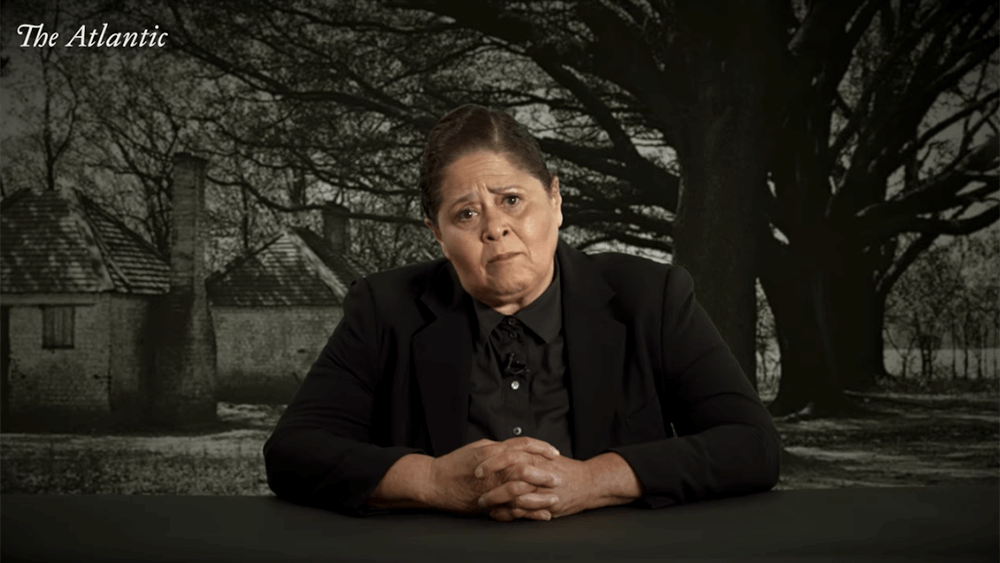
Actress and playwright Anna Deavere Smith performs an excerpt from a story by William Parker, a man who escaped slavery and published his harrowing experience in The Atlantic in February 1866.
COVID forced The Atlantic, which has held The Atlantic Festival annually since 2008, to go virtual for the second time. Digiday spoke with Candace Montgomery, senior vice president and general manager of AtlanticLIVE, the media company’s live event division, to learn what they did differently for this year’s virtual event, which just wrapped Sept. 30. (You can view interviews from the festival’s Ideas Stage on YouTube; the Digiday interview is available only to Digiday subscribers.)
The Ideas Stage launched with a reading of an excerpt of “The Freedman’s Story,” about a slave escaping to a free state, published in The Atlantic in 1866, and read by actor Anna Deavere Smith. The Atlantic was founded in 1857 “by leading abolitionists to illuminate ‘the American idea,’” a slide explains after Deavere Smith’s dramatic reading. “They intended it to be ‘fearless and outspoken’ at the dawn of ‘a new era of human civilization.’ Now, 164 years later, that mission is as urgent as ever.”
Here are highlights from Digiday’s interview with Montgomery, focusing on what was new about the festival this year.
- Held over a longer period of time. The in-person festival usually runs over four days. This year, the event was held over seven days over the course of two weeks — Sept. 22-24 and Sept. 27-30. Montgomery told Digiday that this was based on viewing patterns from other virtual events The Atlantic has held this year, when “we saw people are getting busier, people are going out in the evenings. We are doing shorter days over a longer period of time, with more daytime programming, to accommodate the audience’s busy schedules and how people’s lives are adapting to the new normal,” she said.
- Upping the production and experience. This year’s event featured a new format and platform, and for the first time, gave attendees the opportunity to curate their experience by adding sessions to their calendar around five content tracks: business and tech; climate; culture; health and race; and identity and politics. “We also improved the production value and quality,” Montgomery said. Sessions were recorded live from The Atlantic’s set in Washington, D.C. “We really doubled down on the platform experience,” she said. “We created videos that we play during breaks of the show to help people navigate the platform better, to find out how to chat, network, and find the schedule.”
- Focus on engagement metrics, not just attendee numbers. Montgomery noted that virtual events can attract far more attendees than an in-person event. The 2021 festival, at the time when Digiday spoke with Montgomery, had nearly 23,000 registrations, but she said, “we are not just focused on registrations, but on engagement as well. We are at 43 percent yield right now, which is great in terms of registration to attendees. Engagement is up compared to last year. We are at 1.5 million views across all platforms on social, including YouTube, Twitter and LinkedIn.”
- Changing sponsorship opportunities. The Atlantic was so successful attracting sponsors that attendance to the festival was free this year. “Sponsorship revenue from the Atlantic Festival increased 60 percent from 2020 to 2021,” Montgomery said. “We attribute that to thinking about our brand integrations, improvements in the platform, and putting our editors forward.” The 15 underwriters of the festival this year were given expanded opportunities “across the rest of our product suite. …. So it’s not just the event, but it could be media spend, digital integration, custom content, or a more integrated package,” she said.
- Flexibility is key. When asked whether the event will be ticketed next year, Montgomery said they weren’t sure. “We are an evolving and growing business, so we have to think creatively about how we are going to market,” she said. “It may not always be this model. We are thinking about how to evolve and grow.”
